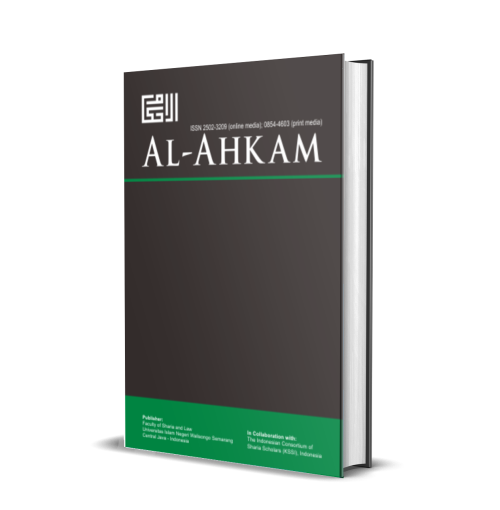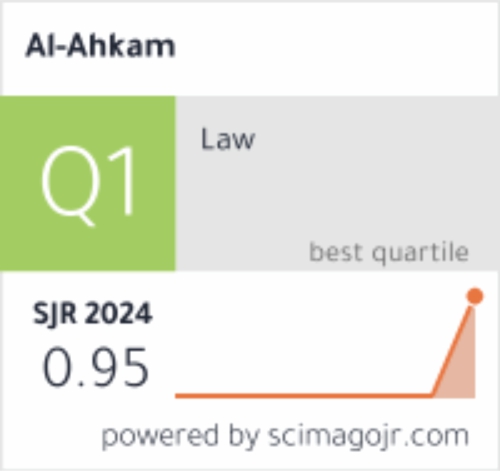KRITERIA 29: CARA PANDANG BARU DALAM PENYUSUNAN KALENDER HIJRIYAH
DOI:
https://doi.org/10.21580/ahkam.2015.25.2.602Keywords:
hilāl, penanggalan Islam, kriteria, Kriteria 29, Kalender HijriyahAbstract
Hilāl is an early marker of the beginning of the Hijriyah/Qamariyah. The existence of the new moon was used as a reference in the preparation of a system of Islamic calendar. The issue of the new moon it is still be an interesting thing to be studied. In fact there is a lot of research and discussion related with hilāl issues. However, it still has not found an appropriate formula to be used as a reference in creating a standardized system of the Islamic calendar. Currently, there are several criteria that offered to make the calendar system. In this paper, will be presented criteria and other perspectives in formulating a Hijriyah calendar, called the Criteria 29. Some examples of simple calculations and discussions in determining the first day of month of the Hijriyah presented briefly. This elaboration of “Criteria 29” hopefully can give an idea and different viewpoints in order to develop Hijriyah calendar.Downloads
References
Azhari, Susiknan, Pembaharuan Pemikiran Hisab di Indonesia, Yogyakarta: Pustaka Pelajar, 2002.
Departemen Agama RI, 2009, Syaamil Al-Qur’an dan Terjemahnya, Bandung: Sygma Examedia Arkanleema.
Dershowitz, Nachum dan Edward M. Reingold, Calendrical Calculations, New York: Cambridge University Press, 1997.
Djamaluddin, Thomas, Menggagas Fiqih Astronomi, Bandung: Kaki Langit, 2005.
Fauzan, Ahmad, Melacak Algoritma Hisab Awal Bulan Qomariah dalam Kitab Nurul Anwar, Jurnal Penelitian, Vol. 11, No. 1, Mei 2004.
Fitriyani, Vivit, Penerapan Ilmu Astronomi Dalam Upaya Unifikasi Kalender Hijriyah di Indonesia, Makalah untuk Annual Conference on Islamic Studies (ACIS) ke-12 Tahun 2012 di Surabaya
Grenville, G.S.P. Freeman, The Muslim and Christian Calendars, New York: Oxford University Press, 1963.
Hambali, Slamet, Pengantar Ilmu Falak: Menyimak Proses Pembentukan Alam Semesta, Banyuwangi: Bismillah Publisher, 2012.
Ilyas, Mohammad, Sistem Kalendar Islam dari Perspektif Astronomi, Kuala Lumpur: Dewan Bahasa dan Pustaka, 1997.
Izzuddin, Ahmad, Fiqih Hisab Rukyah: Menyatukan NU & Muhammadiyah dalam Penentuan Awal Ramadhan, Idul Fitri, dan Idul Adha, Jakarta: Erlangga, 2007.
Jauharī, Ṭanṭawi, al-Jawāhir fī Tafsīri al-Qur’ān, juz 5, Mesir: Musṭafā al-Bābī al-Ḥalbī, 1928.
Jauharī, Ṭanṭawi, al-Jawāhir fī Tafsīri al-Qur’ān, juz 6, Mesir: Musṭafā al-Bābī al-Ḥalbī, 1928.
Jayusman, Isyarat Penentuan Awal Bulan Kamariah dalam al-Qur’an: Mencermati Perbedaan Kriteria dan Metode Penetapan Awal Bulan Kamariah di Indonesia, Jurnal al-Dzikra, Vol. 5, No. 09, Juli-Desember 2011.
Khazin, Muhyiddin, Ilmu Falak dalam Teori dan Praktik, Yogyakarta: Buana Pustaka, 2004.
Khazin, Muhyiddin, Kamus Ilmu Falak, Yogyakarta: Buana Pustaka, 2005.
Majelis Tarjih dan Tajdid Pengurus Pusat Muhammadiyah, 2009, Pedoman Hisab Muhammadiyah, Yogyakarta: Majelis Tarjih dan Tajdid PP Muhammadiyah.
Muslim, Abī Husain, Ṣaḥīḥ Muslim, Riyadh: Dār al-Ṭayyibah, 2006
Nashirudin, Muh., Kalender Hijriyah Universal: Kajian atas Sistem dan Prospeknya di Indonesia, Semarang: El-Wafa, 2013.
Rohmat, Penentuan Awal Bulan Qamariyah menurut Muhammadiyah, Jurnal Ijtimaiyya, Vol. 7, No. 1, Februari 2014.
Downloads
Published
How to Cite
Issue
Section
License
By submitting an article to the journal, the author(s) agree to transfer the published article's copyright to the journal, which will act as the publisher. This means the journal will have the right to publish the article in various forms, including reprints. The journal will maintain the publishing rights to the published articles.
In line with the license, authors and third parties (readers, researchers, and others) are allowed to share and adapt the material. In addition, the material must be given appropriate credit, provided with a link to the license, and indicated if changes were made. If authors remix, transform or build upon the material, authors must distribute their contributions under the same license as the original.




